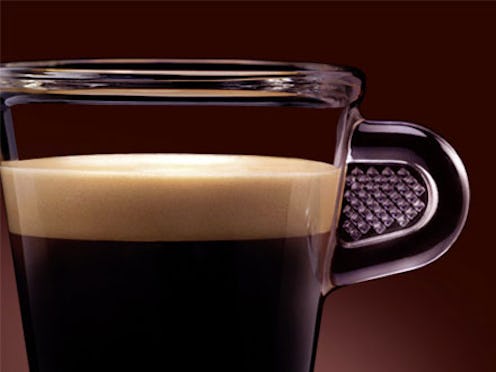News
A Nestle Nespresso Machine Is A-Coming

It's already been a rough week for caffeine lovers, with coffee retailers raising their prices left and right due to a harsh drought in Brazil. Fortunately, there is good news on the coffee horizon: Nestle is developing a Nespresso with nutritional benefits, adding a blend of vitamins and minerals to your morning cappuccino. The food and beverage giant is utilizing its own scientific research arm, the Nestle Institute of Health Sciences, to produce a new device through its "Iron Man" program. If it's successful, you may just have your own, personalized espresso machine in the near future.
How would this new Nespresso machine work? For starters, it'll be tailor-made to one's body deficiencies and needs. Nestle researchers are reportedly analyzing people's levels of various vitamins and minerals. The ultimate goal is to not only provide people with the right amount of essential nutrients, but to also treat gastrointestinal, metabolic and brain disorders.
“Iron Man is an analysis of what’s missing in our diets, and a product, tailored to you, to help make up that difference,” NIHS director Ed Baetge told Bloomberg. He added that the Nespresso product will be more effective than store-bought mineral supplements.
“In the past, food was just food," Baetge said. "We’re going in a new direction.”
Established in 2011, the Nestle Institute of Health Science is part of the company's global research and development network. The institute currently works on understanding the role of nutrition so it can better apply it to Nestle products.
The new-and-improved Nestle Nespresso machine wouldn't be the first product of the company to help treat health disorders. In 2012, the company developed a "medical food" for the clinical dietary management of Alzheimer's patients with help from a partnership with a U.S. neuroscience firm. “Our stake in Accera is a strategic step forward in building up our brain health portfolio,” Nestle Health Science President and CEO Luis Cantarell said at the time.
In 2013, the Nestle Institute of Health Science also acquired the U.S. medical food company Pamlab to develop more food products for patients with mild cognitive impairment, diabetic peripheral neuropathy and depression. Cantarell said the acquisition would help Nestle with its long-term goal of providing "nutritional solutions for people with chronic medical conditions."
But developing personalized Nespresso machines may take longer than the projected five to 10 years. Not to mention, the machines may not work unless a person has done a nutrient profile — an expensive test that figures out which vitamins and minerals your body desperately needs.
Of course, that hasn't stopped Nestle and its scientific researchers from dreaming the impossible dream. "“If we do this right, it can be the next microwave in your kitchen," Baetge said.
Images: Nestle.com